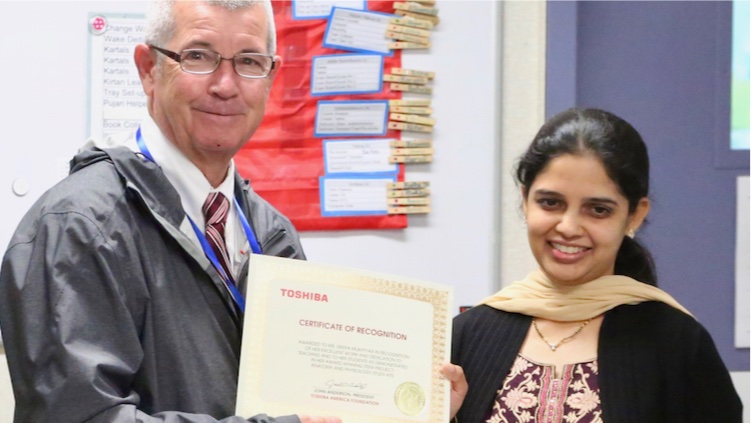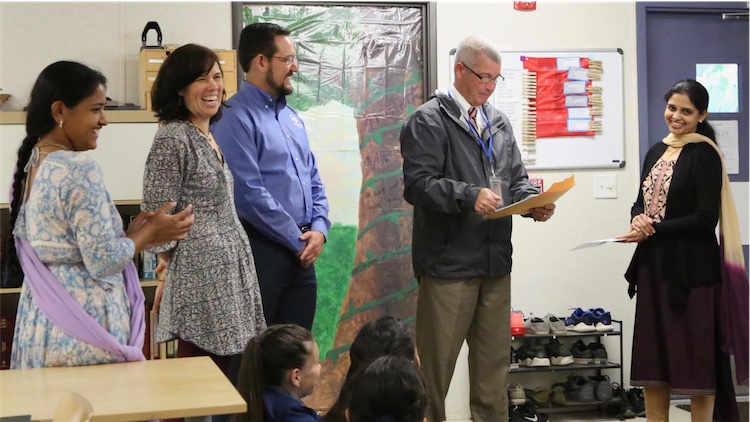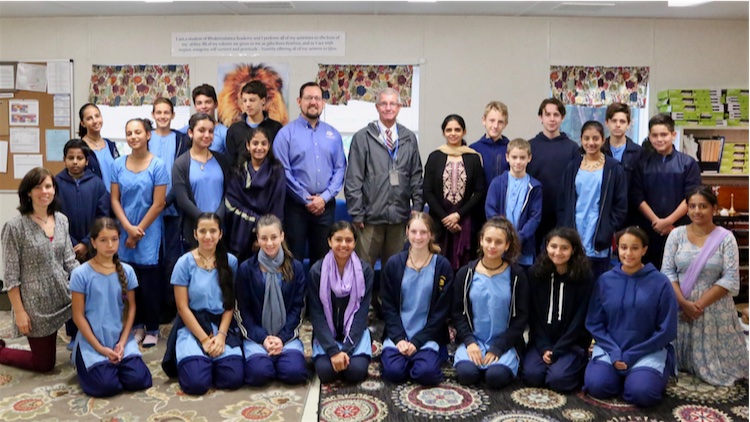Bhaktivedanta Academy Receives Grant for Science Education
By Madhava Smullen | Ноя 16, 2018

Bhaktivedanta Academy, a combined Montessori – International Bacchalauratae school at ISKCON of Alachua, Florida, has been awarded a $3,000 grant for science education.
Deepa Mukhtyar, the science teacher for Krishna Sharanam, the school’s Middle Years program, applied for the grant from the Toshiba America Foundation, and received approval on October 23rd.
“This is a national program, so it was quite a surprise that it came through for us,” says Bhaktivedanta Academy principal Visvambhar Aguilera. “Often you apply for these grants but don’t necessarily expect to get them. So when we did we were rather excited!”

Krishna Sharanam class lead teacher Jay Sri Radhe Kaseder (second from the left) and Bhaktivedanta Academy director Vishvambhar Aguilera (3rd from the left) have been instrumental in encouraging and helping Deepa Mukhtyar throughout the grant application process.
The Middle Years program, which runs from seventh to tenth grade, covers different areas of science over a four-year-cycle, such as physics, chemistry, and this year, biology. The new grant will provide high quality anatomical models of different bodily systems for the students to study, which are normally too expensive for the school to buy.
The five models they’ll receive are of the heart; digestive system; skeleton; brain; and kidneys. Along with these will be miscellaneous charts and posters related to the various systems of the body.
All this equipment will give students an in-depth and practical understanding of how these systems are constructed. According to Deepa Mukhtyar specific objectives are: 1) To be able to identify the major parts of the human musculo-skeletal system; 2) To explain how muscular contraction enables motion of the musculo-system; 3) To identify the different portions of the human heart and explain how they function in maintaining blood flow through the circulatory system; 4) To identify the major parts of the human digestive and excratory system; 5) To identify the major parts of the brain; and 6) To reflect on the impact of science, how the different systems keep the body healthy, and why these organs are necessary for the function of the human body.
“In biology in particular, having a good foundation in terms of the workings of the human body is important,” Visvambhar says. “Particularly if we have students with an interest in going into the medical field.”
Indeed, there is a lot of enthusiasm among students for science. “Science is such a fun way to learn more about are planet and its history”, says Nikunja Gallant, 7th grader, and according 8thgrader Harini Burke, “science classes are an innovative way of learning more about our world and how we came to be.”

The Krishna Sharanam class is looking forward to using the new science equipments.
Recently, in August, Bhaktivedanta Academy received International Baccalaureate accreditation after a rigourous five-year process, which recognizes it as a holistic educational program that fully prepares students for life beyond the school.
“We see our responsibility at Bhaktivedanta Academy as preparing students for whatever they may decide to do in their life,” Visvambhar says. “And having a solid science background is the starting point for multiple career interests.
“In addition, science is a vehicle by which we’re able to teach valuable processes of thinking and problem-solving that students can then learn to apply in numerous settings,beyond just regular science.”















